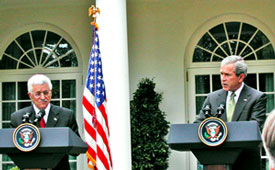
THE WHITE HOUSE (FinalCall.com) – All sides are claiming victory following Palestinian Authority President Mahmoud Abbas’s first-ever meeting here with President George W. Bush May 26.
A Palestinian leader declared the visit a “big success.”
Pres. Bush expressed confidence in the new Palestinian leader, when he said that $50 million in U.S. aid to improve housing in Gaza would be paid for the first time directly to the Palestinian Authority.
Even Israeli leaders put a positive “spin” on the meeting.
The most important achievement for Pres. Abbas’s visit was that Pres. Bush pledged that the final status issues like Jerusalem, borders, refugees, settlements and water “must be agreed upon through negotiations,” Palestinian chief negotiator Saeb Erekat said in an interview with the “Voice of Palestine” radio, according to People’s Daily Online.
“We really believe that this is a reiteration of the firm position of the United States toward the peace process,” said Mr. Erekat.
Mr. Bush demanded that Israel dismantle illegal settlements and stop the expansion of existing settlements in the occupied West Bank with an especially sharp rebuke. “Israel should not undertake any activity that contravenes roadmap obligations or prejudice final status negotiations with regard to Gaza, the West Bank and Jerusalem,” Pres. Bush told a joint news conference in the Rose Garden, after meeting with Pres. Abbas.
“Therefore, Israel must remove unauthorized outposts and stop settlement expansion,” he added. Pres. Bush also reiterated his commitment to the implementation of the Road Map peace plan and the creation of an independent Palestinian state. “We remain committed to the roadmap as the only vision of two states living side by side,” he said. The new aid for housing in Gaza is part of a $350 million package earmarked for the Palestinians.
The so-called roadmap peace plan, brokered by the U.S., EU, UN and Russia, has been largely deadlocked since it was launched two years ago. It is a phased plan that aims at ending the Israeli-Palestinian conflict within two years and establishing a viable independent Palestinian state.
For his part, Pres. Abbas expressed his confidence about the U.S. role in achieving peace in the region, but said that time was short. “Time is the greatest enemy of peace in the Middle East. And the time for half-solutions, interim agreements and partial accords is over. It is no longer enough to simply manage the conflict while Israel unilaterally acts,” Pres. Abbas said in the Rose Garden press conference. “For the sake of peace and democracy, it is time to end the conflict,” he insisted.
The Palestinian leader also criticized Israel’s disengagement from the Gaza Strip this year. “It is not a gesture of peace, rather it diverts attention away from Israel’s expansion of the West Bank,” he argued, noting that Israel wants to control Gaza’s borders, airspace and coast after the withdrawal. “Palestinians fear that the Gaza Strip will become a large prison,” he added.
After the meeting, however, Israel said it was confident that Pres. Bush’s Middle East policy and commitment to halting militant violence remained unchanged. “There is no room for doubt; President Bush is opposed to terror. I don’t think he would compromise on this,” Israeli Vice Premier Shimon Peres said, according to Reuters in Jerusalem.
Pres. Bush did not repeat demands that the Palestinian Authority disarm and dismantle militant groups, a core Israeli condition for resuming negotiations on Palestinian statehood. “I suppose he (Pres. Bush) did this in private talks (with Pres. Abbas),” Mr. Peres told Israel Radio.
Israel also shrugged off as nothing new Pres. Bush’s call for a halt to the expansion of Jewish settlements in the occupied West Bank, a key clause in the Road Map. “When they (the Americans) want to strengthen Abu Mazen (Pres. Abbas) a little, they emphasize the Road Map, the need to return to negotiations, (and they mention) settlements,” Israeli Vice Prime Minister Ehud Olmert said. “When they want to strengthen our side, they talk about the need to silence terror completely,” he said on Army Radio.












